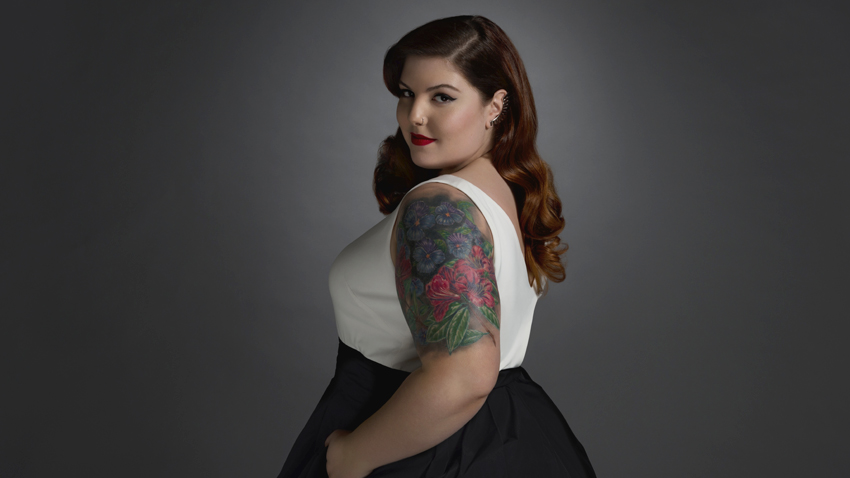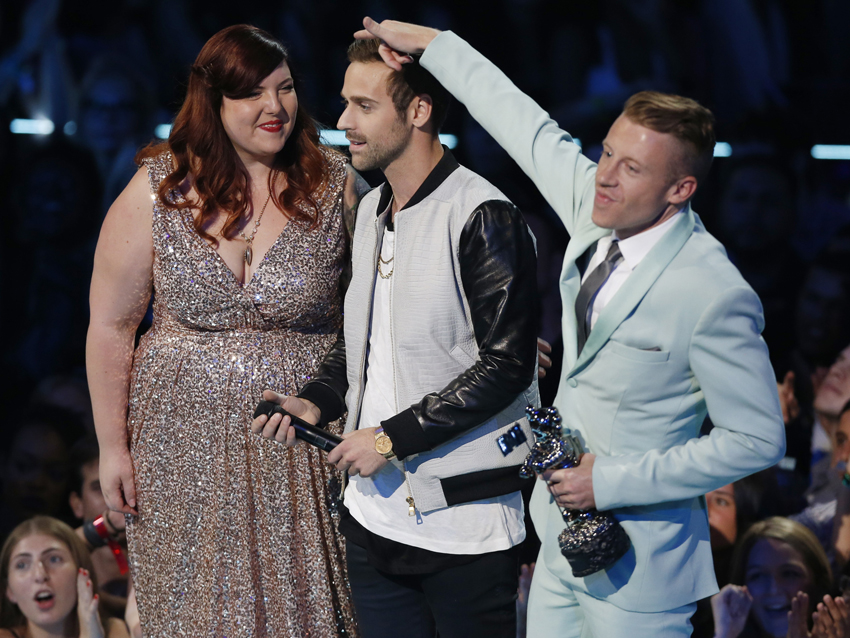
As far as big splashes go, Mary Lambert went all the way in 2013. For her contribution to Same Love, Macklemore & Ryan Lewis' chart-topping gay rights anthem, the Seattle-based singer-songwriter and poet has already collected an impressive array of awards, and at this month's Grammys she stands a good chance of sharing Song Of The Year honors.
Lambert is also three for three at realizing her childhood dream of becoming a singing, dancing waitress. "It's true, I did tell my mother that," she says with a laugh. "I just loved serving people. I had my little notepad - I must've been about six years old - and I'd go around to family members: 'And what would you like to order?' I just liked catering to people."
Lambert points out that she worked three waitressing jobs while recording the songs on her just-released major-label debut EP, Welcome To The Age Of My Body. "At one point, I was doing both of those things, and I was taking remedial ballet," she says. "So there you go - I got to do everything at once."
On the new EP, Lambert continues the Same Love thread on the stirring She Keeps Me Warm, and she triumphs on the haunting, elegiac Sarasvati. Lambert sat down with MusicRadar recently to talk about working with Macklemore and Ryan Lewis, her songwriting process and whether she views herself as a message-based entertainer.
Things are happening pretty fast for you. How does the reality of success compare to the fantasy?
"You know, there's a disconnect between the idea of being an artist and understanding the business side of it, that if you want to sustain yourself as a musician and an artist, you also have to be a mogul. You have to try to figure out how to market yourself and make it all work. None of that occurred to me years ago when I envisioned my life as a performer. It takes time for that kind of thing to hit you - and to make sense out of it."
When you hooked up with Macklemore and Ryan Lewis, what kind of shape was Same Love in? Did they have everything but the chorus?
Get the MusicRadar Newsletter
Want all the hottest music and gear news, reviews, deals, features and more, direct to your inbox? Sign up here.
"The song was basically done. The beats were there. Ben's verses were all pretty much as they are now, but there was no coda. Basically, what we recorded were four different choruses. I came up with the choruses, and we just tracked them all in the studio. Ryan did a really great job. This is where he really shines as a producer: He took all the choruses I sang and make them work in the song. I think that's pretty remarkable."
You told a journalist that when you finished the track, you feared for your safety. What did you mean by that?
"I thought in my head, 'If this song breaks big… ' See, here's the thing: I actually expected the song to be big locally around Washington. I thought it would hit the gay community and maybe be big at pride festivals - things like that. But it did cross my mind that if the song took off, and if it caught wind at conservative radio and in the Bible Belt, if I toured down there I should be concerned for my safety.
"So I protected myself as far as my privacy is concerned. I had sort of this oath to myself after we released the song, that if this was going to be the way I was going to die, that it would be an honorable way to die. [Laughs] That sounds kind of crazy when I say it now."
But that fear could have hit you at any point, I imagine - it didn't have to be about that one song.
"Right, but with that song I was broadcasting it to the world. I was in spotlight, on a platform, and not only saying that it's OK, but it's me declaring that I'm gay, that I have a partner, and I'm not apologizing for it. I'm not sorry."
Same Love has had a profound impact on a good many people. Overall, though, do you think that music can affect society - can change people's minds even - the way it did back in the '60s? It seemed as though artists were really driving the narrative back then.
"They were, that's true. Back then, there was a big social awareness - the musicians and artists were a huge part of it. I mean, I wasn't around in the '60s or the '70s, but when I think of people like John Lennon or Janis Joplin, I think of artists who were present politically and musically. U2 is another one. Those are artists who raised consciousness and awareness.
"I think that the music industry has done a really incredible job of keeping those things out; they want to keep people in a blissful state of being unaware. But I don't think it's the duty of artists to raise issues - I think it just happens. As a performer and a writer, I want to talk about these things. I want to make an impact through music. I really do think that's possible. But that's not to say everything I listen to or do has to be, you know, heavy."
Right. There's still a lot to be said for music as sheer entertainment.
"Oh, of course. I think that's what I was trying to get at. Sometimes I just don't want to think about where we are socially or politically, or to think about the state of humanity. There's a time and a place for both. Sometimes you just want a good love song or a good breakup song. Or sometimes a song changes the world."
Did you have any trepidation about continuing the Same Love thread on She Keeps Me Warm?
"Totally. I didn't want to do it, and I did it reluctantly. I was pushed - propelled - by fans. Every time I did a show, after Same Love was released, I kept hearing from fans: 'Why didn't you do Same Love?' 'We want to hear Same Love.' And I'd be like, 'I don't rap!' [Laughs] And I didn't want to perform to a track - that's just not my style. I didn't want to do just the chorus.
"So I started thinking of something I could do that could appease those fans but also something I could be proud of that wouldn't be a cop-out. I wanted it to be strong musically. But, you know, there's another side of it: One of the reasons why Same Love resonated with people is because the chorus has so much heart to it, and it came from a real emotional point of view. What I wanted to do was write a love song that just happened to have female pronouns, without the intention of it being political. Obviously, making that conscious decision was inherently political, but at least the intention and the message that's there are not."

Lambert on stage with Ryan Lewis and Ben Haggerty (Macklemore) at the MTV Video Music Awards in Brooklyn, New York, August 26, 2013. © ERIC THAYER/Reuters/Corbis
Talk to me about the story behind Sarasvati. I hear shades of Joni Mitchell and Sarah McLachlan in that one.
"Wow, thanks. I'm super flattered. The label pushed for that one, which was pretty surprising. 'Sure, you want a song about me being near suicide?' [Laughs] I was about 19, and this was after I'd come out and had my conflicts with the Christian community, and I was really sad and feeling empty. This was sort of a love song to death. I was really obsessed with the glory of my own death at one point. This song sort of reflects obsessing with death being beautiful in some respects.
"It was definitely a hard song to track. We did 11 takes straight through, and by the end of it I just collapsed. I was like, 'I can't do this song anymore. It's so sad!' It's dark, but I thought it was important to say, 'It's OK to feel sad. It's OK to have those feelings of vulnerability.'"
Do you have any kind of process for writing, a favorite way for doing things?
"Whether it's at a piano or with a guitar, I'll find some chords that work together to see where they take me. I like surprising myself technically, but I'm working on curbing that. The academic side of me is always saying, 'Don't be boring! [Laughs] Put in a weird time signature. Kick it out of C.'
"So I start with chords, some kind of progression, and usually what's written first is sort of the chorus. I try to make sure that I write the melody and lyrics at the same time. I think that they should be married at all times, because there's nothing worse than hearing lyrics that sound super-forced into a melody."
How do you rate yourself as a guitarist and pianist?
"In my opinion, I'm a terrible guitarist [laughs] - even though I've been playing since I was nine. I never wanted to take lessons, mostly because I'm as stubborn as it gets. But with me, I want the guitar to do something sonically even if I don't know what I'm playing, if that makes any sense. I kind of approach the instrument the way a kid would - I think that's a nice way of going about it.
"I'm a bit more technically adept on the piano, but I'm still not excellent. I mean, I'm surrounded by incredible musicians on a daily basis, so I'm like, 'I'm all right. I'm an OK pianist.' But I also feel that way about my voice; I think I have a pretty decent voice. I feel really strong about my writing. I think that's where I shine."
How do you record demos? Do you have any kind of home studio?
"Well, the wonderful thing about smartphones now is that they have voice recorders. That's generally what I do - if I have an idea, if I'm humming a melody, I'll just record it on my phone. Musically, when I'm putting down any kind of ideas, I'll use a keyboard that has a record function. I'll layer melodies on top of one another, counter melodies and stuff like that. I can do up to about seven layers, so it's cool to experiment with strings when I'm writing parts.
"That's about it - the voice recorder on the phone and a keyboard. Then, if I have something that sticks, I'll get it down to where I can perform it; then I'll try it out on audiences and see how it's received, and if it's received well I'll demo it in the studio, and then rerecord it and get it done. That's generally how it goes. Right now, that works for me."
Joe is a freelance journalist who has, over the past few decades, interviewed hundreds of guitarists for Guitar World, Guitar Player, MusicRadar and Classic Rock. He is also a former editor of Guitar World, contributing writer for Guitar Aficionado and VP of A&R for Island Records. He’s an enthusiastic guitarist, but he’s nowhere near the likes of the people he interviews. Surprisingly, his skills are more suited to the drums. If you need a drummer for your Beatles tribute band, look him up.










